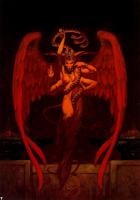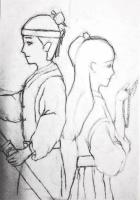There he undoubtedly passed the twelve years of his captivity, and there the royal warrant for his release found him "a prisoner in the common gaol for our county of Bedford." But though far different from the pictures which writers, desirous of exhibiting the sufferings of the Puritan confessor in the most telling form, have drawn - if not "a damp and dreary cell" into which "a narrow chink admits a few scanty rays of light to render visible the prisoner, pale and emaciated, seated on the humid earth, pursuing his daily task to earn the morsel which prolongs his existence and his confinement together," - "the common gaol" of Bedford must have been a sufficiently strait and unwholesome abode, especially for one, like the travelling tinker, accustomed to spend the greater part of his days in the open-air in unrestricted freedom. Prisons in those days, and indeed long afterwards, were, at their best, foul, dark, miserable places. A century later Howard found Bedford gaol, though better than some, in what would now be justly deemed a disgraceful condition. One who visited Bunyan during his confinement speaks of it as "an uncomfortable and close prison."Bunyan however himself, in the narrative of his imprisonment, makes no complaint of it, nor do we hear of his health having in any way suffered from the conditions of his confinement, as was the case with not a few of his fellow-sufferers for the sake of religion in other English gaols, some of them even unto death. Bad as it must have been to be a prisoner, as far as his own testimony goes, there is no evidence that his imprisonment, though varying in its strictness with his various gaolers, was aggravated by any special severity; and, as Mr. Froude has said, "it is unlikely that at any time he was made to suffer any greater hardships than were absolutely inevitable."The arrest of one whose work as a preacher had been a blessing to so many, was not at once tamely acquiesced in by the religious body to which he belonged. A few days after Bunyan's committal to gaol, some of "the brethren" applied to Mr. Crompton, a young magistrate at Elstow, to bail him out, offering the required security for his appearance at the Quarter Sessions. The magistrate was at first disposed to accept the bail; but being a young man, new in his office, and thinking it possible that there might be more against Bunyan than the "mittimus" expressed, he was afraid of compromising himself by letting him go at large. His refusal, though it sent him back to prison, was received by Bunyan with his usual calm trust in God's overruling providence. "I was not at all daunted, but rather glad, and saw evidently that the Lord had heard me."Before he set out for the justice's house, he tells us he had committed the whole event to God's ordering, with the prayer that "if he might do more good by being at liberty than in prison," the bail might be accepted, "but if not, that His will might be done."In the failure of his friends' good offices he saw an answer to his prayer, encouraging the hope that the untoward event, which deprived them of his personal ministrations, "might be an awaking to the saints in the country," and while "the slender answer of the justice," which sent him back to his prison, stirred something akin to contempt, his soul was full of gladness. "Verily I did meet my God sweetly again, comforting of me, and satisfying of me, that it was His will and mind that I should be there." The sense that he was being conformed to the image of his great Master was a stay to his soul. "This word," he continues, "did drop in upon my heart with some life, for he knew that 'for envy they had delivered him.'"Seven weeds after his committal, early in January, 1661, the Quarter Sessions came on, and "John Bunyan, of the town of Bedford, labourer," was indicted in the customary form for having "devilishly and perniciously abstained from coming to church to hear Divine Service," and as "a common upholder of several unlawful meetings and conventions, to the great disturbance and distraction of the good subjects of the kingdom." The chairman of the bench was the brutal and blustering Sir John Keeling, the prototype of Bunyan's Lord Hategood in Faithful's trial at Vanity Fair, who afterwards, by his base subserviency to an infamous government, climbed to the Lord Chief Justice's seat, over the head of Sir Matthew Hale. Keeling had suffered much from the Puritans during the great Rebellion, when, according to Clarendon, he was "always in gaol," and was by no means disposed to deal leniently with an offender of that persuasion. His brethren of the bench were country gentlemen hating Puritanism from their heart, and eager for retaliation for the wrongs it had wrought them. From such a bench, even if Bunyan had been less uncompromising, no leniency was to be anticipated. But Bunyan's attitude forbade any leniency. As the law stood he had indisputably broken it, and he expressed his determination, respectfully but firmly, to take the first opportunity of breaking it again. "I told them that if I was let out of prison today I would preach the gospel again to-morrow by the help of God." We may dislike the tone adopted by the magistrates towards the prisoner; we may condemn it as overbearing and contemptuous; we may smile at Keeling's expositions of Scripture and his stock arguments against unauthorized prayer and preaching, though we may charitably believe that Bunyan misunderstood him when he makes him say that "the Book of Common Prayer had been ever since the apostles' time"; we may think that the prisoner, in his "canting pedlar's French," as Keeling called it, had the better of his judges in knowledge of the Bible, in Christian charity, as well as in dignity and in common sense, and that they showed their wisdom in silencing him in court - "Let him speak no further," said one of them, "he will do harm," - since they could not answer him more convincingly: but his legal offence was clear. He confessed to the indictment, if not in express terms, yet virtually. He and his friends had held "many meetings together, both to pray to God and to exhort one another. Iconfessed myself guilty no otherwise." Such meetings were forbidden by the law, which it was the duty of the justices to administer, and they had no choice whether they would convict or no. Perhaps they were not sorry they had no such choice. Bunyan was a most "impracticable" prisoner, and as Mr. Froude says, the "magistrates being but unregenerate mortals may be pardoned if they found him provoking." The sentence necessarily followed. It was pronounced, not, we are sure reluctantly, by Keeling, in the terms of the Act. "He was to go back to prison for three months. If at three months' end he still refused to go to church to hear Divine service and leave his preaching, he was to be banished the realm,"- in modern language "transported," and if "he came back again without special royal license," he must "stretch by the neck for it.""This," said Keeling, "I tell you plainly." Bunyan's reply that "as to that matter he was at a point with the judge," for "that he would repeat the offence the first time he could," provoked a rejoinder from one of the bench, and the unseemly wrangling might have been still further prolonged, had it not been stopped by the gaoler, who "pulling him away to be gone," had him back to prison, where he says, and "blesses the Lord Jesus Christ for it," his heart was as "sweetly refreshed" in returning to it as it had "been during his examination. So that I find Christ's words more than bare trifles, where He saith, He will give a mouth and wisdom, even such as all the adversaries shall not gainsay or resist. And that His peace no man can take from us."The magistrates, however, though not unnaturally irritated by what seemed to them Bunyan's unreasonable obstinacy, were not desirous to push matters to extremity. The three months named in his sentence, at the expiration of which he was either to conform or be banished the realm, were fast drawing to an end, without any sign of submission on his part. As a last resort Mr. Cobb, the Clerk of the Peace, was sent to try what calm and friendly reasoning might effect. Cobb, who evidently knew Bunyan personally, did his best, as a kind-hearted, sensible man, to bring him to reason. Cobb did not profess to be "a man that could dispute," and Bunyan had the better of him in argument. His position, however, was unassailable. The recent insurrection of Venner and his Fifth Monarchy men, he said, had shown the danger to the public peace there was in allowing fanatical gatherings to assemble unchecked.
同类推荐
热门推荐
女权天下—琼蓝国
“各位同学们,我刚刚发明了一个手游叫做《女权天下》,你们回去玩一下呗!”“是关于什么的游戏啊?”窈窈问道。“想知道,那你们就快去玩吧!至于游戏的人物设定嘛,那都是按照你们每个人的性子来制作的。中途会有惊喜哦。”范范说。“好的,范范。我们可以回家了吗?好累啊!”露露说。“好吧,你们回去吧,记得一定要玩哦!”范范说。同学们回到家中,都看了一下这个游戏,发现这个游戏如果不一次性打完,就无法退出,于是都准备先睡一觉,明天起来再玩。结果,他们一觉醒来,记忆全部消失了,而且身边的一切都发生了翻天覆地的变化,取而代之的都是古代的各种人物,并且他们身边还出现了陌生人。一场穿越之旅就此展开。















